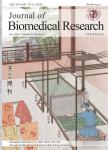The more the messier:centrosome amplification as a novel biomarker for personalized treatment of colorectal cancers
The more the messier:centrosome amplification as a novel biomarker for personalized treatment of colorectal cancers作者机构:Department of Biology Georgia State University Atlanta GA 30303 USA Novazoi Theranostics Inc. Piano TX 75025 USA Institute of Biomedical Sciences Georgia State University Atlanta GA 30303 USA Center for Obesity Research Georgia State University Atlanta GA 30303 USA
出 版 物:《The Journal of Biomedical Research》 (生物医学研究杂志(英文版))
年 卷 期:2016年第30卷第6期
页 面:441-451页
核心收录:
学科分类:1002[医学-临床医学] 100214[医学-肿瘤学] 10[医学]
主 题:centrosome amplification colorectal cancer chromosomal instability aneuploidy biomarker prognostic
摘 要:Colon cancer is currently the third most common cancer and second most fatal cancer in the United States,resulting in approximately 600,000 deaths *** colorectal cancer death rates are decreasing by about 3%every year,disease outcomes could be substantially improved with more research into the drivers of colon carcinogenesis,the determinants of aggressiveness in colorectal cancer and the identification of biomarkers that could enable choice of more optimal *** carcinogenesis is notably a slow process that can take *** factors that contribute to the development of colon cancer are mutational,epigenetic and environmental,and risk factors include age,history of polyps and family history of colon *** cancers exhibit heterogeneity in their features and are often characterized by the presence of chromosomal instability,microscopic satellite instability,or CpG island methylator *** this review,we propose that centrosome amplification may be a widespread occurrence in colorectal cancers and could potently influence tumor ***,the quantitation of this cancer-specific anomaly could offer valuable prognostic information and pave the way for further customization of treatment based on the organellar profile of *** stratification models that take into account centrosomal status could thus potentially reduce adverse side effects and result in improved outcomes for colorectal cancer patients.



